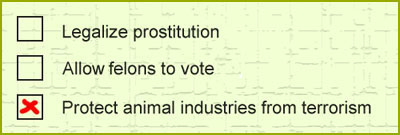When Congress might not be the best target
Clearly, some policy reforms are more plausible than others. Take for example the "Animal Enterprise Terrorism Act," passed by the House last week and now awaiting the President's signature. You know all those animal liberationists running around releasing mink, vandalizing McDonalds restaurants, and threatening vivisectors? Well we already have laws targeting them. But...why miss a golden opportunity to shore up your political base by expanding the reach of these laws in the name of the War on Terror?
Sure, civil libertarians may quibble with the sweeping breadth of the new bill (animal rights tactics that threaten a company's profits - e.g., nonviolent civil disobedience - will be treated as terrorism), but you're not likely to find many politicians willing to risk political capital on a bill like this (silly Rep. Kucinich!).
Championing prisoners' rights - you know, the little stuff like voting or protection against rape - may not be politically expedient but these issues do seem to be becoming thinkable. 16 states have already loosened their disenfranchisement policies in the past ten years, and with 80 percent of Americans in support of restoring voting rights to former felons, surely politicians are clamoring to introduce such legislation, right? Uh-huh.
On Saturday night I attended an event artfully dubbed "Whores Not Wars." It was at once an anti-war and pro-sex worker fundraising event for Food Not Bombs and the local Sex Workers Outreach Project:
...featuring provocative live performance art, whore stories, lap dances, sexy soldiers, and anti-war, pro-whore activities...Prepare to be titillated, disturbed, outraged, pleasured, stimulated, and shocked! Bastardized military gear, pro-peace costumes encouraged!Legalization of prostitution and the de-stigmatization of sex work are top priorities for this group of current and former sex workers. Without saying anything about the group's abysmal success at organization-building, I can say with some confidence that achieving their stated goals will be a herculean political task. It's easier to imagine prostitutes at the center of a political scandal than at the center of legislation to protect their rights.
The political process has a way of pushing minority voices to the margins...and then outlawing them. Once they're outlawed, it sometimes takes away their rights to protest, or vote. It's times like these that social insurgents might want to reevaluate the targets of our campaigns. "Rights" don't always come down from the government but sometimes have to be taken up in other spheres like the economy, education, and religion. This is not to say that change will come necessarily come more quickly there, but some issues seem more apt for political campaigns than do others.
Follow-up (11/22/2006): Animal protectionism is on the ballot in the Netherlands today and stands a damned good chance of winning. That country's Party of the Animals is widely expected to become the "first animal rights party in Europe to have its own lawmaker," as it has been polling between 130-140,000 votes (50,000 are needed to gain a seat in the legislature) [1]. It certainly is amazing how a proportional-representation system can change the possibilities.
Labels: animal rights, politics, social movements
